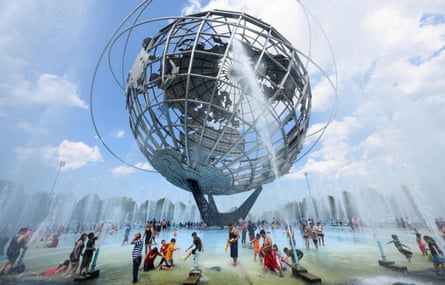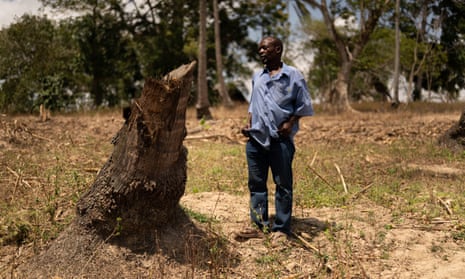Recently, I interviewed a 70-year-old coconut farmer, who told me about the hundreds of trees he was losing to the drought ravaging his home town of Rabaiin southern Kenya. Fighting back tears, he told me how weather patterns that he could no longer master or predict had left him without a way to provide for his family. He and the other farmers here may not know the science behind climate change but it’s a part of their lived reality.
I live in my home country of Kenya now, but have spent several years in the USwhere I’ve experienced the effects of climate change too. In 2015, when I graduated from one graduate programme, Boston was experiencing one of its most intense snowstorms on record. About 108 inches (9ft) of snowfall blocked the roads and sidewalks, prompting the city to impose driving bans and shut down public transport. At university, classes were cancelled due to extreme weather.
My second graduation in 2019 coincided with the world’s second hottest year on record. In New York City, summer temperatures soared to heights of 35C (95F), making the blistering heat a topic of conversation: “hot girl summer” became a catchphrase, and my non-American friends and I laughed at the country’s affinity for air conditioning..

It’s odd, and often unsettling,to watch the different ways climate change has played out inthese two countries. It’s still acceptable in the US to question anthropogenic climate change, with some denying that the climate is changing, or dismissing the scientifically proven consequences of it. But you’ll rarely find a climate denier in east Africa. Most people have either witnessed or been affected by extreme weather events.
In west Africa too, a friend of mine scoffed at the idea of anyone denying climate change while living on the continent: “What would anyone in Nigeria gain from denying climate change?” he asked . The country has been hit by its worst floods in more than a decade, killing more than 600 people and displacing at least 1.4 million. But why hasn’t it received more international interest? The prevailing sense, he said, is that Africa is “no stranger to tragedy”, and somehow this latest incident was no different.
Every week, I see at least one story on how the drought in the north of Kenya is pushing millions of people towards starvation, and it is a devastating story to cover. The situation there mirrors what’s happening in much of the Horn of Africa, which is facing its worst drought in decades. Uganda, Tanzania and the Democratic Republic of Congo have all faced deadly flooding this year, displacing thousands. The situation is far worse in south Sudan, where last month, record rains flooded two-thirds of the country.
The US has faced fires, hurricanes and cyclones. But it’s very obvious that the capacities of governments in the global north to respond to these emergencies are far greater than those in the global south can muster. The US government can send huge rescue and support efforts in climate emergencies such as Hurricane Ian, with thousands of responders and tens of millions of dollars in support for affected families. It’s absolutely right – but it’s impossible for most developing country’s governments.
Climate disasters like drought, gain a fair amount of government attention and resources to put out fires, as well as the necessary water and emergency food supplies. But the future relies on a sustainable climate response.
We’re all affected by climate change, but some countries are impacted more directlyand destructively. I’ve even come across lists on the “best places to live to avoid climate change”. But for populations in many parts of the world, there’s no escaping it nor is there any sign of rescue.
One-upmanship on who is facing the worst impacts oftenmirrors the “Black Lives Matter/All Lives Matter” debate, and diverts discussions away from context, nuance or weighted solutions. Yet it remains at the crux of climate summits each year. Technical proposals involving “carbon taxes” and “carbon budgets”, which hold historical and current emitters to account, make important contributions to addressing impacts and adaptation options, and reducing future emissions.
after newsletter promotion

Industrialised nations have not kept their promise to channel $100bn a year to developing nations: a sum that’s just a fraction of what’s needed to fight the climate crisis. Climate financing to African governments is mainly in the form of loans – approved in boardrooms, by leaders that are somewhat insulated or removed from the situation – driving a number of countries in the region even deeper into debt to tackle the crisis.
Calls for Africa to avoid coal and fossil fuels are seen as hypocriticaland have prompted fierce pushback from leaders across the continent. Africa emits less than 4% of global carbon emissionsopposes the idea that they should hold back on the use of fossil fuels at the expense of development, while their global counterparts gain heavily from their use and millions of Africans still don’t have access to electricity.
Even as the continent continues to be disproportionately affected, African climate change activists are often excluded or tokenised at global summits or conferences: mirroring the struggles of the continent and power imbalances in international discussions on global warming.
As the effects of climate change continue to worsen, many are hoping that Cop27 breaks away from previous summits, and that equitable solutions emerge which recognise the severity of the crisis, especially in parts of the world that are experiencing it most.
